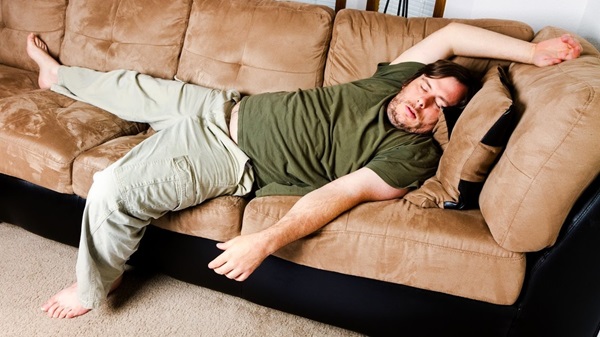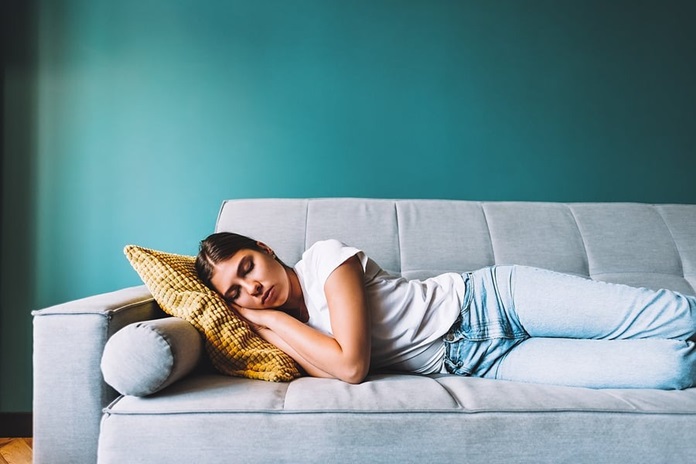The couch holds a special place in our hearts as a haven of comfort and relaxation. It’s where we unwind after a long day, binge-watch our favorite shows, and sometimes even take spontaneous naps. However, amidst its coziness, the question often arises: is it a bad idea to sleep on the couch regularly? While it might seem convenient at first, sleeping on the couch regularly might not be the best idea in the long run.
Considering factors like physical health, sleep quality, and mental well-being, exploring the pros and cons of couch sleeping reveals a complex story. In this discussion, we’ll explore the various aspects surrounding this practice, shedding light on whether this seemingly harmless habit may have some hidden downsides.
Couch vs. The Bed
The couch and bed are distinctly designed to serve their primary purposes: socializing and sleeping. Beds are usually crafted to offer full-body support and comfort for extended periods of rest, while couches prioritize short-term relaxation.
Beds are designed to provide support for the spine, neck, and limbs, while couches, despite their comfort, offer a different level of ergonomic support.

The sofa is a multipurpose piece of furniture that transitions effortlessly from daytime lounging to impromptu naps, its versatility lends itself to a myriad of activities. However, in the long run, the lack of proper support in your sleeping area could result in discomfort or even pain. Therefore, as a general guideline, your bed is the superior choice to ensure a night of restorative sleep.
Benefits Of Sleeping On The Sofa
The sofa can indeed be the most comfortable choice for sleeping sometime. Particularly, if you have specific health conditions, sleeping on the couch might offer the optimal sleep experience for you. Such as,
Cold or Flu
It can be tough to feel cozy in bed when you are congested or feverish. In this case, lying on the couch can help you to feel comfortable. Plus, if you lie down with your head up higher than your legs, it might help clear your stuffy nose and make it easier to sleep when you’re sick.
Remember, your couch doesn’t soak up sweat as your mattress does, so if you’re sweating a lot from a fever or chills, sleeping on the couch might make it damp.
Insomnia
If you are having trouble falling asleep (insomnia), falling asleep on the couch for a few nights might provide a change of scenery and help your brain recalibrate as you drift off.
Keep in mind that if you have insomnia and your brain gets too used to sleeping on the couch, it might become difficult to go back to sleeping in your bed. Consider purchasing a new mattress if yours is uncomfortable and keeps you awake at night.

However, remember it might be difficult to go back to sleeping in your bed if you get too used to sleeping on the couch. Similarly, if your mattress is uncomfortable and keeps you awake at night, consider buying a new mattress.
Orthostatic Hypotension
Orthostatic hypotension is a condition in which your blood drops while you stand up because of autonomic nervous system dysfunction. Similarly, individuals with orthostatic hypotension might have high blood pressure when they’re lying down.
Medical professionals often suggest raising the head of the bed to help blood pressure while sleeping, but studies disagree on whether this helps with orthostatic hypotension symptoms.
Also read, Positioned for Perfection: Discovering the Best Sleeping Positions for Quality Rest
Disadvantages of Sleeping on the Sofa
It’s fine to sleep on the couch for some time, however, couches aren’t meant for sleeping; they’re designed for sitting up and relaxing. Sleeping on the couch might lead to some consequences.
Sleeping on the couch may cause Leg Pain
When you lay down on a couch, you might notice that you’re too long for it, which can result in your legs awkwardly sticking over the edge of the couch while you sleep. While a bit of leg elevation in your sleep can help your blood flow, if your feet dangle for a long time, it could make your lower limbs feel numb or tingly.
It may cause Neck and Back pain
Several studies have shown that sleep posture is a crucial predictor of stiffness, back pain, and neck pain. If you have ever woken up on the couch with a stiff neck or pinched nerve, it’s likely because of how you were sleeping. The safest way to sleep is with spine and neck support which sleeping on the couch doesn’t necessarily provide.

If you fall asleep on the couch occasionally and feel a bit of nerve pain or stiffness when you wake up, it’ll probably go away during the day. But if you continue sleeping on the couch regularly, it can cause lasting problems for your lower back and neck.
Not suitable for babies
Infants should not sleep on sofas whether sleeping alone or with a parent as they are likely to get stuck in tight spots or have their airflow blocked, which can be dangerous. An analysis of over 1,000 sleep-related infant deaths has shown that about 13% of infant sleep-related deaths involve sofas. Babies sleeping on sofas are much more likely to experience sudden infant death syndrome (SIDS) compared to those sleeping on safer surfaces like mattresses.

Experts strongly advise against parents and babies sleeping together because the risk of sudden infant death is much higher which is about eight times more than when sleeping on a bed.
It may cause poor sleep quality
If you doze off on a couch in a shared space, you are likely to be interrupted by someone else moving around during the night. Also, sleeping on the couch often means falling asleep in front of the TV which can disrupt your REM sleep, leading to unsettling dreams and more frequent awakenings during the night. So it is advised you to keep phones and TV screens out of your primary sleeping space.

Here are some guidelines for sleeping comfortably on a sofa
If you’re planning to sleep on the couch, there are steps you can take to reduce the chances of waking up with a pinched nerve or a sore back.
- Treat your couch like a mattress and enhance its comfort by dressing it with breathable, moisture-wicking cotton sheets.
- Avoid using throw pillows or couch cushions to sleep on. Use a firm pillow with a removable pillowcase to support your neck.
- Try to sleep in a good posture. If you nod off on the couch, try to lie flat on your back, stretching out over the full length of the couch.
- Turn off your TV and place your phone where you can’t reach it before you go to sleep for the night. It’s best to avoid screens for at least an hour before bedtime to improve the quality of your sleep.
Frequently Asked Question
Is it bad for my health to sleep on the couch regularly?
While occasional naps on the couch may not have significant health consequences for most people, regularly sleeping on a couch can lead to discomfort, poor sleep quality, and potential long-term issues such as back pain and spinal misalignment.
Can sleeping on a couch cause back pain?
Yes, sleeping on a couch can contribute to back pain, especially if it lacks adequate support.
You may also like to read, Are You Struggling to Fall Asleep? Here Are 8 Methods You Can Try Tonight
